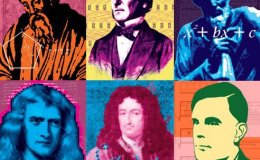Greatest Mathematicians of All Time web source: http://fabpedigree.com 1. Isaac (Sir) Newton (1642-1727) England Newton is regarded as the Father of Calculus (which he called “fluxions”); he shares credit with Leibniz for the Fundamental Theorem of Calculus (that integration and differentiation are each other’s inverse operation). He applied calculus for several purposes: finding areas, … Continue reading
Georg Friedrich Bernhard Riemann
5. Georg Friedrich Bernhard Riemann (1826-1866) Germany Riemann was a phenomenal genius whose work was exceptionally deep, creative and rigorous; he made revolutionary contributions in many areas of pure mathematics, and also inspired the development of physics. He had poor physical health and died at an early age, yet is still considered to be among … Continue reading
Leonhard Euler
4. Leonhard Euler (1707-1783) Switzerland Euler may be the most influential mathematician who ever lived (though some would make him second to Euclid); he ranks #77 on Michael Hart’s famous list of the Most Influential Persons in History. His colleagues called him “Analysis Incarnate.” Laplace, famous for denying credit to fellow mathematicians, once said “Read … Continue reading
Johann Carl Friedrich Gauss
3. Johann Carl Friedrich Gauss (1777-1855) Germany Carl Friedrich Gauss, the “Prince of Mathematics,” exhibited his calculative powers when he corrected his father’s arithmetic before the age of three. His revolutionary nature was demonstrated at age twelve, when he began questioning the axioms of Euclid. His genius was confirmed at the age of nineteen when … Continue reading
Archimedes of Syracuse
2. Archimedes of Syracuse (287-212 BC) Greek domain Archimedes is universally acknowledged to be the greatest of ancient mathematicians. He studied at Euclid’s school (probably after Euclid’s death), but his work far surpassed the works of Euclid. His achievements are particularly impressive given the lack of good mathematical notation in his day. His proofs are … Continue reading
Isaac (Sir) Newton
1. Isaac (Sir) Newton (1642-1727) England Newton is regarded as the Father of Calculus (which he called “fluxions”); he shares credit with Leibniz for the Fundamental Theorem of Calculus (that integration and differentiation are each other’s inverse operation). He applied calculus for several purposes: finding areas, tangents, the lengths of curves and the maxima and … Continue reading





